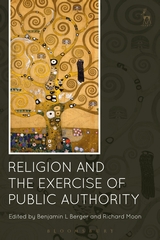Religion and the Exercise of Public Authority

Religion and the Exercise of Public Authority
Benjamin L Berger, Richard Moon, eds.
Hart Publishing 2016
In the burgeoning literature on law and religion, scholarly attention has tended to focus on broad questions concerning the scope of religious freedom, the nature of toleration and the meaning of secularism. An under-examined issue is how religion figures in the decisions, actions and experiences of those charged with performing public duties. This point of contact between religion and public authority has generated a range of legal and political controversies around issues such as the wearing of religious symbols by public officials, prayer at municipal government meetings, religious education and conscientious objection by public servants.
Authored by scholars from a variety of disciplines, the chapters in this volume provide insight into these and other issues. Yet the volume also provides an entry point into a deeper examination of the concepts that are often used to organise and manage religious diversity, notably state neutrality. By examining the exercise of public authority by individuals who are religiously committed – or who, in the discharge of their public responsibilities, must account for those who are – this volume exposes the assumptions about legal and political life that underlie the concept of state neutrality and reveals its limits as a governing ideal. – See more at: http://www.bloomsburyprofessional.com/uk/religion-and-the-exercise-of-public-authority-9781849467155/#sthash.FQHAtXqV.dpuf